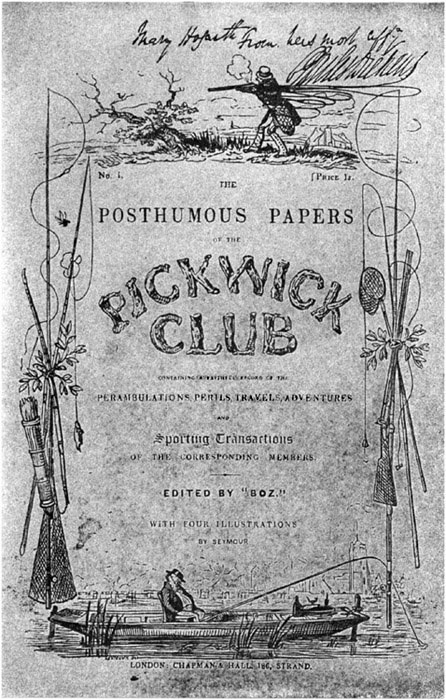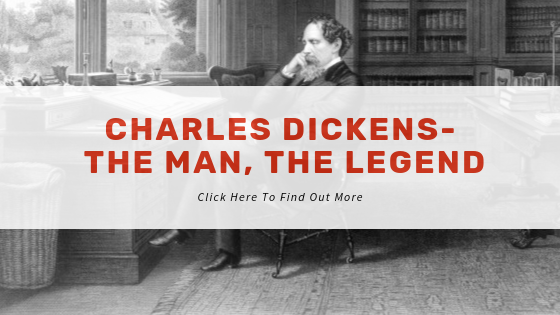The author of at least 24 books, Charles Dickens wrote fiction that was a social commentary of the time and yet his observations of life and society are just as pertinent today.
So who was this author? Who was he before his novels came to be popular?
Before the Pickwick Papers
Published in instalments from 1836 to 1837, the Pickwick Papers have widely triumphed as the work of fiction that gave Charles Dickens his fame. But he’d had literary success before this.
Born in Portsmouth in 1812, his father was a clerk at the Royal Dockyard. In 1815, the family moved to London with the father’s new posting. Staying just short of two years, the family returned to Sheerness and then back to Kent in what Dickens described as a pleasant boyhood.

But once again, life was interrupted with a return to London. Life took a sinister turn. With his father imprisoned for debt, Dickens was put to work in a blacking factory in 1823. Finishing his schooling the following year, these humiliations would be the driving force behind his writing in coming years.
With his schooling behind him, he found employment with a solicitor’s practice. He was lively and intelligent, character traits that made him a popular freelance reported of law cases in the 1830s. In 1831, he also started to report on activities in Parliament.
What Defines Charles Dickens and his Work?
The Pickwick Papers were his first taste of success. As well as continuing to write short pieces, Oliver Twist and Nicholas Nickleby appeared to cement his place as one of the nation’s favourite authors.
Certainly, the success of The Old Curiosity Shop, you would think that he was ‘safe’ as an author. But like all creative endeavours, not everything written hits the mark. There was a slump in how well his works were received for a short time in the early 1840s, his reputation as being a first-class author not restored until The Christmas Carol. Even Martin Chuzzlewit took some time to become well received.
As an author, there are many aspects that define the work of Dickens but it was the effect he had on social change that perhaps is his most defining characteristics.
The humiliation of his father’s imprisonment and the treatment of the family as a result of owing money runs through every page of his work but in particular Oliver Twist. The Poor Laws were a set of laws that defined the Victorian age but it was his commentary of these laws and attitudes through his novels that showed the realism of what these laws meant.
Bleak House is also considered a formative work when it comes to throwing a spotlight on the social issues of the time. From social analysis to protest, within the pages of every Dickens novel is a barely concealed thread of the distaste of the social norms of the time.
Who can forget his description of ‘baby farms’ from Oliver twist? With a mortality rate as high as 90%, Dickens writes of his fictional character Oliver, “that he should be despatched to a branch-workhouse some three miles off, where twenty or thirty other juvenile offenders against the poor-laws rolled about the floor all day, without the inconvenience of too much food, or too much clothing, under the parental superintendence of an elderfemale who received the culprits for the consideration of sevenpence-halfpenny per small head per week
The offence that Oliver and the other children had committed was to be poor and parent-less. The coolly emotive way he describes the lack of food and lack of clothing is far more heart rendering that it would be if he over-dramatized the description. And again, using the phrase ‘per small head’ reminds the reader these are children we are talking about, many of whom would be infants or, as we refer to them today, toddlers.
But there were other things that the writing of Charles Dickens gave us. Prince Albert is often referred to as the man who gave Britain the Christmas tree and Dickens as the man who reminded us to honour the day for what it should be. His descriptions of the festive season and ‘white Christmas’ in particular is often thought to be the reason why Christmas day became a public holiday eventually.
We also forget that Dickens in spite of his commentary on Victorian poverty was a man full of wit. He himself was a performer, often giving speaking tours that left audiences rocking with laughter. He loved the theatre, writing plays too that are said to have amused Queen Victoria.
His works have also lasted the test of time. As well as being popular books, there are modern-day films – who doesn’t love The Muppet’s Christmas Carol – as well as serious works based on his writing.
For other authors, he showed the way when it came to character development, more importantly, the names of characters. The most popular have entered the English language. To call or refer to someone as a scrooge has a direct link to the character of the same name from A Christmas Carol.
His work also changed – and continues to change – how we see the law. Critical of how the law treated the poor in Victorian times, the questions posed in Bleak House and the Pickwick Papers, as well as the sometimes scathing commentary, are still of importance today. Why do we penalise people when they have little or no money? Why is being poor still seen as something to be ashamed of?
The Work of Charles Dickens
He wrote over twenty novels but many more short stories and plays, as well as commentaries and material for his writing tours, continuing to write until his death in 1870. He left a novel unfinished, The Mystery of Edwin Drood.
It is hard to narrow down which of these works are his best but there are some that shine above the others.
Great Expectations is arguably his most famous novel. It chronicles to coming of age of Pip, from a young orphan to gentleman and the people he meets along the way. There are some scathing passages on societal norms of the time and we meet characters who would normally have been invisible, such as Magwitch, the convict with a heart of gold. Finding true happiness, this is a delightful tale.
A Tale of Two Cities transports the reader to London and Paris during the time of the French Revolution. A rarity amongst Dickens’s work – it is the only piece of historical fiction in his collection – it too has biting commentary and observation through its characters.
If you read nothing else of Dickens, then make it Bleak House. Regarded as one of his most complex novels, it revolves around the long-running legal case Jarndyce vs Jarndyce. There were many critics of this book, especially of its description of the British legal system at the time and yet, many Historians and commentators agree that the radical reforms of the 1870s were in part due to the descriptions of the legal system treated people in Bleak House.
Oliver Twist, the work that is arguably the closest to the humiliation Dickens’ felt at being poor, is also a fascinating insight into society of the time. If you want a sense of the personal world of Dickens in adulthood, reading the novel David Copperfield will take you there. A father of 10 children himself, Dickens is said to have referred to David Copperfield as his ‘favourite child’.
To experience the magic of Dicken’s description of a white Christmas, reading A Christmas Carol should be on your list too. The moral of this story remains as true today as it did 150 years ago – take Christmas to your heart and make it what it should be about: people and love.

The Legacy of Charles Dickens
How can the legacy of this fantastic writer be summed up? As an author, he achieves something that others rarely do – he appeals to everyone.
Within the words on the page, there is a meaning that translates to every reader. A versatile writer, he understands the need for compelling storytelling. This isn’t only found in his written words, but in the speaking tours and performances, he gave. He understood that the words were only a part of the overall experience; the imagery he produced and a gripping story that appealed to every human emotion were just as important.
He was a writer who could produce amazingly complex works. His giant intelligence was balanced by his heart. He didn’t stand on a pedestal and judge others because he believed no one was better or less than anyone else.
There are times when he was unruly yet predictable – most of his characters enjoy a happy ending but what this was could be unconventional for the time – as he was exciting and inexhaustible.
Perhaps his biggest legacy is that even today, no one maligns his work or picks holes in it. There are some that suggest that his work is fiction, his commentary embellished and yet, the history books tell us otherwise.
Charles Dickens died in 1870 after suffering a stroke. He is buried in Westminster Abbey.

